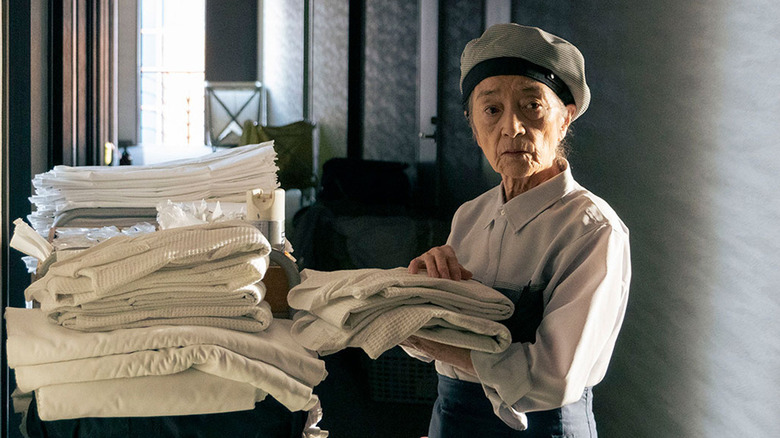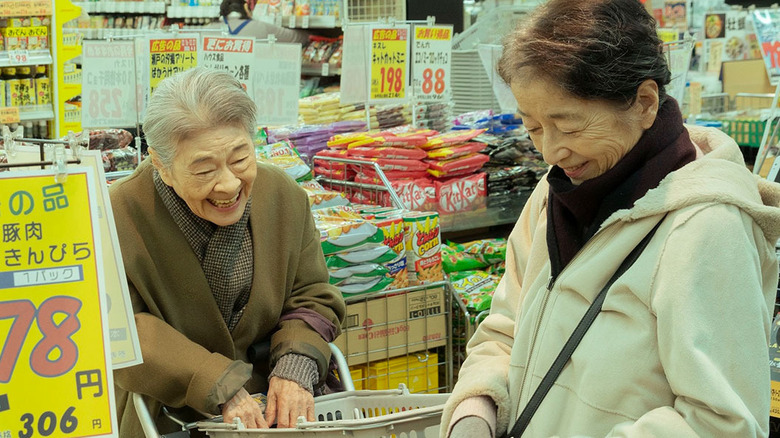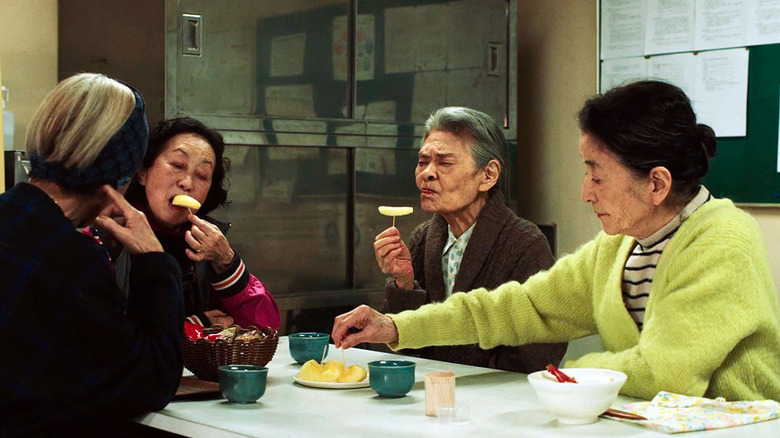Plan 75 Review: Chie Hayakawa Creates A Quietly Subversive Future Dystopia [TIFF]
What is the cost of living?
This question is at the core of "Plan 75," the debut film of Japanese director Chie Hayakawa. The soft-spoken drama imagines a near-future dystopia where Japan's super-aged society has strained the economy to a breaking point. (The country has one of the oldest populations in the world, measured by the percentage of people over the age of 65.) Hayakawa is tapping into very real fears — and not ones limited to just Japan. Here in North America, the last decade has seen rising anxiety over a "silver tsunami" from the baby boomer generation leaving the workforce, requiring health care, and drawing pensions.
"Plan 75" unfurls like an extended thought experiment: What if, to deal with the "burden" of the elderly generation, the government developed a program to eliminate people over the age of 75? One that entices volunteers through messaging about "duty" and a substantial financial reward? This would, theoretically, allow citizens to choose their deaths — getting "control" over the inevitable, as one commercial puts it — in order to opt-out of draining society's resources via euthanasia.
In "Plan 75," the imagined culture in this future Japan has turned against the elderly, with young people even committing violent age-motivated hate crimes. In response to the rising crisis, the Japanese government creates the Plan 75 program, inviting citizens over the age of 75 to sacrifice themselves for the greater good. This is addressing a very real concern presented by demographers and economists, but Hayakawa is presenting a subtle subversion: Taken to an extreme, these age-related fears focus on vilifying the elderly for not fitting into the existing system rather than imagining ways to accommodate this generation.
The future looks bleak
There's an ensemble cast with interwoven stories in "Plan 75," which explores the concept of euthanasia as well as themes of aging, sacrifice, and personal responsibility. Do the elderly have an obligation to end their own lives to lessen the burden on younger generations? Is this really an ethical choice? Does someone who is vulnerable (i.e homeless or depressed) even have the capacity to choose their own death — especially when being manipulated, or at least persuaded, by propaganda and a cash reward?
"Plan 75" is quietly devastating. It presents the elderly as a forgotten generation, left to fend for themselves in an increasingly unwelcoming world. The plight of senior citizens is represented by the experiences of hotel housekeeper Michi (Chieko Baisho); she has no family to care for her, no husband, and few friends for companionship — friends who, because of their age, could (and do) die suddenly and without warning. Michi and the other elderly housekeepers are sweet, friendly, and likable people, and it is absolutely heartbreaking to watch such vibrant women casually discussing what is essentially joint suicide.
The problems presented in "Plan 75" are, in many ways, not really problems at all — and that's a key element of Hayakawa's overall message. Michi is capable of working, despite being 78 years of age. She loses her job because of ageism-motivated forced retirement, not because her work was not satisfactory. Maria (Stefanie Arianne) works in adult care but takes a job with the Plan 75 program because it pays better. The government has the budget for marketing, salaries, and facilities — could that money not be spent on developing social assistance programs where people like Michi and her elderly companions could help take care of each other? The casually cruel messaging of the Plan 75 program seems to be that it wouldn't be "worth it" — the elderly are past their "best before" date, and society is better off without them.
Past their best-before date?
Hiromi (Isomura Hayato) has the most interesting journey in "Plan 75," going from a representative selling the solution to a disillusioned critic. Slowly and gradually, adults in the younger generation — represented by Maria, Hiromi, and Yoko (Kawai Yuumi), who all work for Plan 75 — recognize their own culpability for the current situation. Elders like Michi and Yukio (Takao Taka) aren't faceless parasites stealing the future — they are human beings. They are lonely, isolated people who want to love and deserve to be loved. Their lives, regardless of their ability to produce for a capitalist society, have inherent value.
"Plan 75" invites the audience to contemplate the story's themes and ideas; there is no preaching to or patronizing the viewer. Hayakawa takes a harrowing, prescient story and injects some much-needed optimism, all without ever succumbing to saccharine sentimentality. Great care is made to make this world as relatable and believable as possible; this could be tomorrow. It could even be today. What's important, however, is that this kind of government-sanctioned mass murder is not inevitable. This is not a story about despair — it's one that inspires hope and, if we're lucky, change.
/Film rating: 8 out of 10


